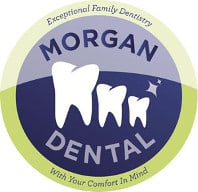What is periodontal disease?
Periodontal disease or gum disease is a bacterial infection, similar to strep throat, of the gums and jaw bone that causes deep pockets around your teeth and permanent gum recession. This infection can be spread from person to person. In some advanced or long term cases it causes erosion of the jaw bone and tooth loss.
What causes periodontal disease?
Periodontal disease is caused by certain strains of bacteria that multiply and attack teeth below the gum line. The bacteria are found in plaque and tartar build-up. Plaque is the soft form that can be brushed and flossed away. Tartar is the hard calcified substance that can only be removed by a dental professional. Without complete removal of tartar and plaque on a regular basis, periodontal disease will continue to progress. Periodontal disease is the #1 cause of tooth loss in adults.
What are the symptoms of periodontal disease?
While periodontal disease is a primarily “silent” condition, some noticeable symptoms can be bleeding gums, bad breath, and gum irritation.
How can periodontal disease be prevented?
Periodontal disease can be prevented with regular dental exams and cleanings at least twice a year as well as correct brushing and flossing at home.
How can periodontal disease be treated?
Early periodontal disease must be aggressively treated in order to see improvement. Treatment includes complete removal of plaque and tartar above and below the gum line, a procedure called scaling and root planning (also called deep cleaning). An anti-infective oral rinse, chlorhexidine gluconate, is also used for 4 weeks to combat this infection. Regular and thorough home care must also be practiced including brushing with a soft bristle brush and flossing. Regular home care will be combined with periodontal dental cleanings (usually every 3 months) and a stannous fluoride rinse to maintain healthy gums. When caught early and treated, the damage caused by periodontal disease can be reversed and the treatment less expensive. Periodontal disease in more advanced stages must be treated by a specialist called a periodontist.
